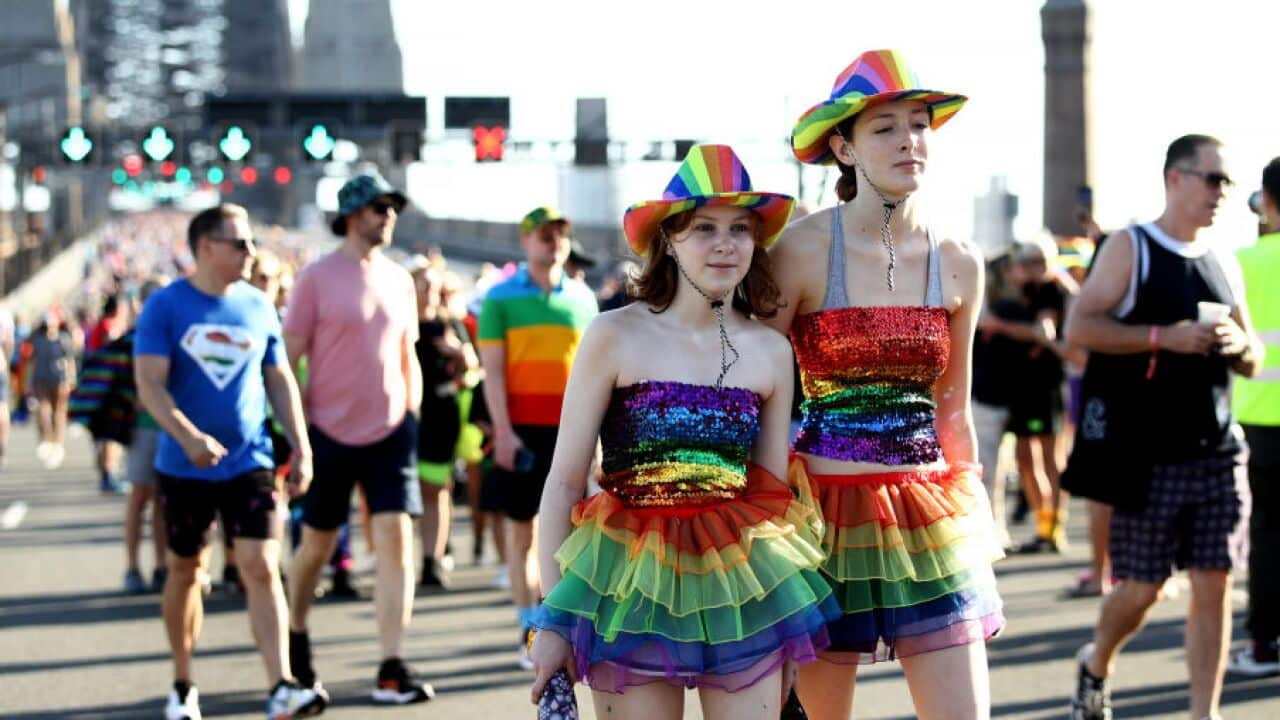Key Points
- Recycled mulch contaminated with asbestos at the playground forces closure of a primary school in Sydney.
- Sydney Gay and Lesbian Mardi Gras organisers cancelled the Fair Day event after asbestos was found at the site.
- There have been a string of similar discoveries of asbestos in Sydney over the past six weeks.
Resurrecting the cancelled rainbow extravaganza Fair Day in Sydney will be "nigh on impossible" after it was shut down following the discovery of asbestos at its parkland venue.
More than 70,000 people were expected to attend Victoria Park in Camperdown on Sunday for the event, only for contaminated mulch to be found at the site this week.
Asbestos-tainted mulch was also behind the closure of a primary school in Sydney's southwest, with authorities conceding on Wednesday students would not be able to return to campus for several weeks.
The park and school are among 22 sites scattered across Sydney found with tainted mulch since 2 January.

Asbestos-tainted mulch has forced a primary school in Sydney's southwest to close for several weeks. Source: AAP / Bianca De Marchi
"We're also putting on a 17-day festival which starts on Friday," Mardi Gras chief executive Gil Beckwith told reporters on Wednesday.
"There's a lot going on, so for us to pivot to a new space within a few days is pretty well, nigh-on impossible."

Revellers ahead of the Sydney Gay & Lesbian Mardi Gras Parade as part of Sydney WorldPride on 25 February, 2023 Source: AAP
"I don't underestimate the logistical challenges but we have to be proactive in these circumstances," he told ABC radio.
Fair Day was "too special" not to try shifting it to another location, Greens MP Amanda Cohn said as she proposed a closed-down King Street in Newtown.
Meanwhile students at Liverpool West Public School have also been offered an alternative location and will continue face-to-face learning at the nearby Gulyangarri Public School in the coming week.
'Can't understand why it's in mulch'
The hazardous material was identified last week in recycled mulch put down at a playground during a recent school upgrade.
The tainted mulch at Victoria Park was identified on Monday after the Environment Protection Authority on Friday alerted the council to a company deep in the recycled mulch supply chain for the City of Sydney.
Sydney Lord Mayor Clover Moore said the council wasted no time to test five parks.
Three positive results, including for the more dangerous friable asbestos at Harmony Park, prompted further testing across 32 sites where the council believes contaminated mulch might have been used.
"We all have a fear of asbestos and we can't understand why it's in mulch, frankly," Moore told reporters.
"We want the government and EPA to get to the bottom of this, find out why and where it's happening and ensure it doesn't happen again."

Bonded asbestos was found in mulch at Victoria Park in Sydney on Monday evening. Source: AAP / Dan Himbrechts
The company on Tuesday said its testing showed mulch stockpiled at its facility was free of asbestos.
It has launched an appeal against a prevention notice issued by the NSW EPA after the watchdog determined it supplied the mulch used at the inner city Rozelle Parklands, the first site where contaminated material was found.
Ross Fox, a lawyer representing Greenlife, said the company was "at risk of being made a scapegoat for failures in a complex supply chain for construction and landscaping projects".
The opposition has called for a searchable central register of all sites under investigation for possible asbestos contamination.
"The public has a right to know if playgrounds and public spaces in their suburbs are under investigation for asbestos contamination," opposition environment spokeswoman Kellie Sloane said in a statement.
The EPA probe has grown to involve 120 investigators, who are working to trace the supply of mulch.
Unlike police, the EPA cannot continue investigations once charges are laid, which the agency on Tuesday acknowledged could frustrate the community seeking quick action.
How dangerous is it?
Bonded or "non-friable" asbestos refers to asbestos that is present in relatively small quantities inside solid materials such as cement- or resin-based products.
These products are typically considered low-risk, but when damaged or badly weathered, the asbestos can become friable or easily crumbled, which can release dangerous asbestos fibres into the air.











